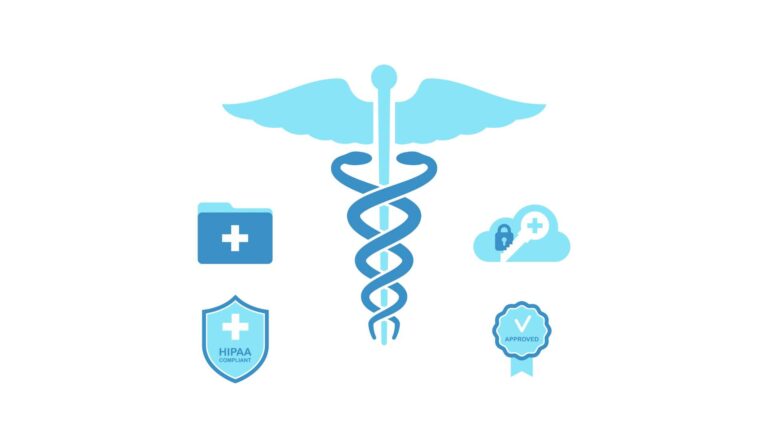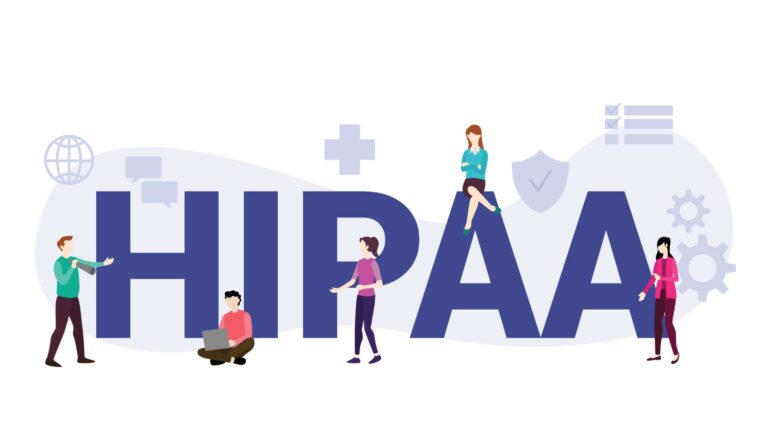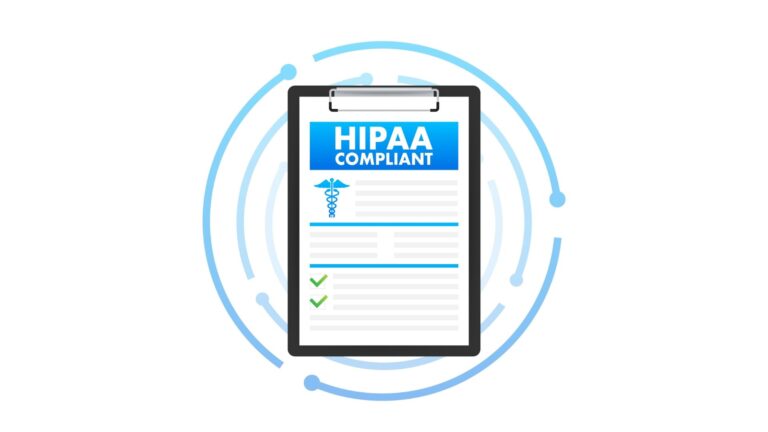Penalties for HIPAA violations can range from minor corrective actions to hefty fines and even jail time.
Key Takeaways
- Fines for HIPAA violations can range from $127 at the lowest tier up to $250,000 in fines and 10 years in prison for criminal penalties.
- Fines are per HIPAA violation, meaning that multiple incidents can add up quickly.
- Intent Matters: Accidental errors carry lesser penalties than willful neglect.
A HIPAA violation can severely damage the reputation of a healthcare organization, provider, or business associate.
If you work in healthcare or your company contracts with a healthcare organization regularly, you must have a comprehensive understanding of HIPAA.
This is not only to keep private health information confidential but also to avoid HIPAA penalties, ranging from hefty fines to criminal charges.
In this article, we’ll go over the penalties for HIPAA violations and provide real-world examples to give you a better understanding of what to avoid.
HIPAA Violation Fines and Penalties
Penalties for not complying with HIPAA rules depend on the type of violation and its severity.
First, it depends on whether the violation was civil or criminal because criminal violations result in higher fines and possibly jail time.
Other factors that affect the outcome of penalties include:
- The extent of the violation, including the type of data exposed and the number of people affected.
- The degree of damage inflicted on patients or others whose information was breached.
- An entity’s history of HIPAA compliance is considered to determine its penalty. Organizations with previous violations or a history of non-compliance face higher penalties.
- How quickly an organization responds to a violation
- The presence or absence of effective training programs. A lack of HIPAA training usually leads to higher fines.
Civil violations
The Office for Civil Rights (OCR) oversees civil violations and can hand out penalties if the violation is not corrected within 30 days.
🧠 Did You Know?
As of January 31, 2024, the OCR has received over 351,372 HIPAA complaints and has conducted over 1,183 compliance reviews and investigations.
In the case of financial penalty, the Health Information Technology for Economic and Clinical Health (HITECH) Act of 2009 outlines a tiered penalty structure:
- Tier 1: Minimum fine of $100 per violation up to $50,000
- Tier 2: Minimum fine of $1,000 per violation up to $50,000
- Tier 3: Minimum fine of $10,000 per violation up to $50,000
- Tier 4: Minimum fine of $50,000 per violation (no maximum penalty)
Note that these figures are adjusted annually to factor in the increase in the cost of living.
Below is the current penalty structure for civil HIPAA violations as of December 2023:
| Tier 1 | The violation is attributed to a lack of knowledge and could not have realistically been avoided. | $137 per violation up to $68,928. |
| Tier 2 | The covered entity should have been aware of the potential for a violation but could not prevent it even with a reasonable amount of care. | $1,379-$68,928 |
| Tier 3 | A violation occurred due to willful neglect of HIPAA laws, and the entity has already attempted corrective actions. | $13,785-$68,928 |
| Tier 4 | A violation occurred due to willful neglect of HIPAA laws or with the intent to sell PHI, and no attempt has been made to correct the violation within 30 days. | Minimum fine of $68,928 per violation |
Most HIPAA violations are actually unintentional and happen by mistake. Therefore, the OCR usually aims to settle breaches without penalties and prefers implementing corrective action plans instead.
In fact, since 2003, the OCR has investigated and resolved over 30,675 cases by requiring changes in privacy practices or by providing technical assistance to HIPAA-covered entities and their business associates.
But for more severe violations, such as those that have gone on for a significant period or in cases of repeated or extensive non-compliance, OCR may decide to impose a fine.
🧠 Did You Know?
A lack of knowledge of HIPAA Rules is not an excuse for non-compliance. Every covered entity and business associate is responsible for ensuring its employees fully understand HIPAA laws and will be held accountable in the event of a data breach.
Criminal violations
Criminal HIPAA violations are prosecuted by the Department of Justice (DOJ), rather than the OCR.
The financial penalty structure for criminal violations is as follows:
| Tier 1 | When someone knowingly discloses PHI. | $50,000 plus up to one year in jail |
| Tier 2 | When someone knowingly gets access to PHI under false pretenses. | $100,000 plus up to five years in jail |
| Tier 3 | Obtaining PHI for personal gain or with malicious intent. | $250,000 plus up to 10 years in jail |
🧠 Did You Know?
As of January 31, 2024, the OCR has received over 351,372 HIPAA complaints and has conducted over 1,183 compliance reviews and investigations.
Even if an organization violates HIPAA, it can avoid heavy penalties by showing that it continues to comply.
Doing so helps show that the breach was not intentional and that the organization actively tries to abide by HIPAA laws.
Generally, the OCR aims to settle breaches without penalties and prefers implementing corrective action plans.
In fact, since 2003, the OCR has investigated and resolved over 30,675 cases by requiring changes in privacy practices and providing technical assistance to HIPAA-covered entities and their business associates.
For more severe violations, such as those that have gone on for a significant period or in cases of repeated or extensive non-compliance, OCR may impose financial penalties.
🧠 Did You Know?
A lack of knowledge of HIPAA Rules is not an excuse for non-compliance. Every covered entity and business associate is responsible for ensuring its employees fully understand HIPAA laws and will be held accountable in the event of a data breach.
Other Consequences of Violating HIPAA
Penalty fees, corrective action plans, and jail time are the primary consequences of violating HIPAA, but there are other repercussions to be aware of, like:
- Damaged reputation and loss of trust: Even after correcting a HIPAA violation, a healthcare provider may face a damaged reputation or an overall lack of public trust.
- Loss of business and revenue: Patients may take their business elsewhere if they feel that their personal health information is not protected, which can result in major profit losses.
- Increased legal liability: Patients or clients may decide to sue a healthcare provider that violated their HIPAA rights, resulting in costly fees.
- Difficulty in attracting and retaining employees: A tarnished reputation due to HIPAA violations can make it challenging for organizations to attract and retain top talent, as potential employees may be reluctant to work for an organization with a history of privacy breaches.
- Increased regulatory scrutiny: Organizations that violate HIPAA may face increased oversight from regulatory bodies, like the OCR and state agencies. More frequent audits, investigations, and potentially harsher penalties for future HIPAA violations are a possibility.
- Disruption of operations: Depending on the severity of the violation, organizations may need to suspend certain services or implement expensive solutions to address the breach and prevent future occurrences.
- Loss of credibility and accreditation: HIPAA violations can lead to the loss of accreditation or certifications for healthcare providers, impacting their ability to operate normally.
Common Types of HIPAA Violations
Here are some of the most common types of HIPAA violations to avoid:
Unauthorized access to PHI
One of the most common HIPAA violations is unauthorized access to PHI. This occurs when somebody, such as employees or healthcare providers, accesses patient information without proper authorization or for reasons unrelated to patient care.
Failure to protect PHI
This can occur when healthcare organizations don’t implement appropriate security measures to safeguard patient information, leading to potential breaches and unauthorized access.
Improper disposal of PHI
When healthcare organizations fail to dispose of private health information securely, such as through shredding or data destruction software, the data is exposed to potential unauthorized access.
Lack of employee training on HIPAA regulations
When healthcare organizations don’t provide adequate education and training to their employees on HIPAA requirements and the proper handling of patient information, it increases the likelihood of accidental breaches and unauthorized disclosures.
Data breaches
Breaches occur when patient information is accessed, used, or disclosed without proper authorization, potentially leading to identity theft and financial fraud. Healthcare providers must have reliable cybersecurity systems and risk management procedures in place to prevent data leaks.
📚This Might Interest You:
Read our in-depth article on what constitutes a HIPAA violation and 9 of the most common examples of violations.
3 Real-World Examples of HIPAA Violations and Their Penalties
- In 2015, Anthem, an independent licensee of Blue Cross Blue Shield, became the target of a series of cyberattacks that led to the largest US health data breach in history that compromised the PHI of nearly 79 million people.
- Anthem had to pay a penalty of $16 million for HIPAA violations to the OCR. The healthcare organization also settled a class-action lawsuit for the breach victims for $115 million in 2018.
- Anthem was also penalized for the following:
- Failing to conduct an enterprise-wide risk analysis
- Insufficient system monitoring procedures
- Failing to implement the minimum access control requirements to protect against cyber attackers.
- In 2013, Advocate Health Care Network (AHN) settled with the OCR for $5.55 million after 3 data breaches:
- AHN failed to have security at one of its offices, resulting in four desktop computers being stolen.
- The company didn’t encrypt its computers, causing a data breach when an employee’s laptop with 2,237 patient records was stolen from an unlocked car.
- AHN did not obtain a business associate agreement before working with a consulting group
The settlement included agreements to address all HIPAA failures within two years.
- New York Presbyterian Hospital and Columbia University Medical Center settled for $4.8 million after a Columbia University physician attempted to deactivate a personal server from the shared data network without any safeguards.
This data breach resulted in 6,800 patient records being put online and becoming searchable by Google.
NY-Presbyterian paid the majority of the fine, around $3.3 million, while Columbia University paid the remaining $1.5 million, totaling one of the largest healthcare fines in history.
How to Avoid HIPAA Violations
You can take several relatively simple measures to mitigate the risk of HIPAA violations.
HIPAA training and education
Provide comprehensive HIPAA training to all employees and business associates who handle PHI. This includes educating them about their responsibilities, the importance of patient privacy, and the consequences of HIPAA violations. Regularly update training programs to ensure your employees remain compliant.
💡 Pro Tip:
With Connecteam, you can easily create your own customized HIPAA training courses. Then, upload them directly into the app so your team can complete them from their mobile devices.
You can use various media types, such as videos and images, and even create quizzes to test your staff’s knowledge retention and update courses whenever you need. Connecteam automatically keeps track of all employees who completed their training to help ensure you remain compliant.
Risk assessments
Conduct regular risk assessments to identify vulnerabilities and security risks in your systems. This will also help you find appropriate strategies to prevent data breaches.
Implement safeguards
Implement strong safeguards to protect patient privacy and secure PHI. This includes using encryption for electronic PHI, establishing access controls, and ensuring physical security measures are in place.
Regularly review policies and procedures
Regularly review and update your policies and procedures to reflect changes in HIPAA regulations and industry standards. This includes ensuring you have proper documentation, incident response plans, and a breach notification process in place.
What is HIPAA?
The Health Insurance Portability and Accountability Act (HIPAA) was passed on August 21, 1996, with three primary purposes: to protect the confidentiality of patient medical data, expand Americans’ access to healthcare, and combat fraud.
🧠 Did You Know?
HIPAA regulations apply to both healthcare providers, often termed as covered entities, and business associates. Under HIPAA, business associates are defined as any third-party company or organization that a healthcare provider may contract with, as this business will also have access to the healthcare provider’s Protected Health Information (PHI).
While HIPAA is an incredibly complex law, this policy is made up of 5 primary rules:
- Security Rule: The Security Rule requires covered entities to implement administrative, physical, and technical safeguards to protect electronic patient health information (PHI). These safeguards aim to prevent unauthorized access, use, or alteration of PHI, ensuring that it remains confidential.
- Privacy Rule: This rule establishes the standards for how covered entities handle and safeguard PHI. The HIPAA privacy rule regulates the use and disclosure of PHI, ensuring that individuals have control over their health information.
- Breach Notification Rule: Organizations must report a data breach within 60 days.
- Omnibus Rule: The Omnibus Rule dictates that HIPAA-covered entities must provide patients with their health records upon request.
- Enforcement Rule: The Enforcement Rule defines procedures for investigating complaints and violations and assessing fines and penalties for non-compliance.
Prevent HIPAA Violations with Connecteam
Take advantage of technology to help you remain HIPAA compliant and avoid violations.
Connecteam is a HIPAA-compliant employee management app designed to make team communication, scheduling, task management, training, and payroll a whole lot easier.
So whether you work for a healthcare organization or contract with one regularly, here’s how Connecteam can help your business remain HIPAA-compliant:
Protect employee and patient data with 2FA, SSO, and data encryption
Connecteam helps you secure employee and patient data with 2-factor authentication (2FA), single sign-on (SSO), and data encryption. You can also set up a password policy requiring employees to use strong passwords for their Connecteam accounts.
With cloud-based document storage, employees can also submit certifications, employment documents, and other files in seconds. You can also share patient documents, scans, or any other PHI within the app without worrying about a HIPAA violation.
Create your own customized HIPAA training courses
With Connecteam’s employee training software, you can create customized HIPAA training courses directly in the app and make them as detailed as you like. Mix up the training materials and keep employees engaged by adding images, videos, gamification elements, and quizzes to test their knowledge.
Employees can complete courses on their own time from their mobile devices to avoid expensive and timely in-person training sessions.
Communicate and share data with 1:1 and group messaging
The employee chat app allows you to create an unlimited number of individual and group chats and share images, videos, documents, and other files directly through messages.
All chat data is end-to-end encrypted, and you can also set customized user access permissions to ensure that only authorized users can access certain conversations.
For extra security, conversations are saved to the cloud and not on users’ devices. This also prevents staff from downloading or exporting chat data.

Set up user access permissions and monitor data use with audit logs
Connecteam makes it easy to assign role-based access permissions to control who has access to what data. This is crucial for maintaining HIPAA compliance since it ensures that only employees who need access to sensitive health information have it.
📚 This Might Interest You:
Stay compliant and safeguard sensitive information! Read our in-depth review of the best HIPAA compliance software to ensure your business meets regulatory standards and avoids costly penalties. Plus, explore the best HIPAA-compliant texting apps to securely communicate with your team and clients. Find the right tools to protect your business today!
Connecteam is designed for organizations of any size
Connecteam isn’t just user-friendly and customizable; it’s also affordable. Basic pricing plans start at only $29/month, and small businesses with under 10 users can use the app’s basic features completely for free.
Note: These prices do not reflect the additional fee of adding HIPAA compliance to an account.
FAQ
Who can be penalized for violating HIPAA?
Healthcare providers, healthcare clearinghouses, health plans, and contracted business associates can all be penalized for violating HIPAA.
What are the penalties and fines for HIPAA violations?
HIPAA violations can result in criminal charges, fines, and imprisonment for criminal violations. Employees who violate HIPAA regulations may face sanctions such as termination, loss of privileges, or retraining.
Are there any exceptions to HIPAA?
Yes, there are several HIPAA exceptions that allow for the disclosure of PHI without the patient’s authorization. Some of the key exceptions include:
- When a healthcare organization is mandated to report PHI to public health agencies.
- When a health insurance company is required to report information for the purpose of an audit.
- If a state law has stricter privacy policies than HIPAA, the state law applies.
- The Military Command Exception: Under this policy, healthcare professionals are allowed to disclose PHI to military authorities without the patient´s authorization to report on the patient´s fitness for duty, fitness to perform an assignment, or fitness to perform another activity for a military mission.
What is a corrective action plan (CAP)?
A corrective action plan for HIPAA violations is a structured response created by the organization responsible for the breach, sometimes with the help of the Department of Health and Human Services.
A CAP outlines specific steps to address and rectify the violation and how to prevent future occurrences. The plan should include identifying the issue, taking immediate action to secure PHI, implementing changes to policies or procedures, and training employees to ensure compliance.
Disclaimer
The information on this website about HIPAA violations is intended to be a summary for informational purposes only. Laws and regulations regularly change and may vary depending on individual circumstances. While we have made every effort to ensure the information provided is up-to-date and reliable, we cannot guarantee its completeness, accuracy, or applicability to your specific situation. Therefore, we strongly recommend that readers seek guidance from their legal department or a qualified attorney to ensure compliance with applicable laws and regulations. Please note that we cannot be held liable for any actions taken or not taken based on the information presented on this website.




